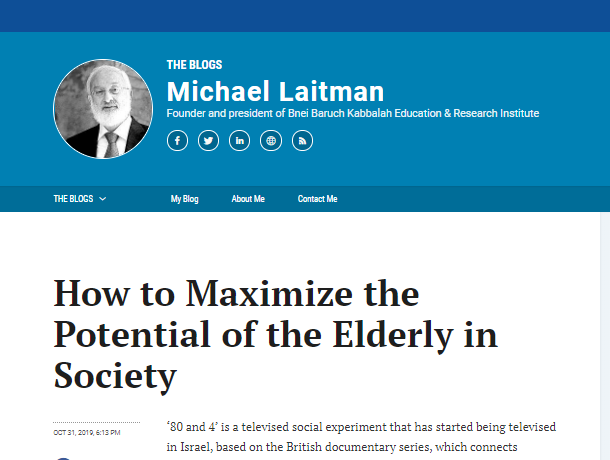
‘80 and 4’ is a televised social experiment that has started being televised in Israel, based on the British documentary series, which connects preschoolers to the elderly. It examines the effects on the 80-plus-year-olds and four-year-olds, and addresses an important topic of intergenerational integration: Are the elderly realizing their fullest potential in benefiting both themselves and society at large?
Intergenerational integration is in fact merely a modern term for the natural connection that used to dwell in every household. I myself grew up in a home with grandparents on both sides. They gave me more attention than my parents. Naturally, parents are busy juggling work and family, and also play a more disciplinary role toward the children, while grandparents generally have a warmer and friendlier relationship with their grandchildren.
According to the wisdom of Kabbalah, familial connection spans three generations: children, parents and grandparents. In the language of Kabbalah, such connection is called Ibur, Yenika and Mochin, three stages of the soul’s growth.
Children and grandparents share a common closeness to nature: the child’s innocence with his undeveloped desires to benefit at the expense of others, and the elderly person’s sensation of living beyond the rat race, having lost interest in the pursuit of money, respect, fame and power.
Their relationship also holds the most common benefit.
It is very important for the health, well-being and vitality of the elderly to feel as contributing members of society. Children provide them with that sensation. Children always need help, can be taught about multiple aspects of life, and need to play in order to enjoy and learn.
When the elderly mingle with the children, they try to act like them, playing as if they were also children. Such activity has a vitalizing physiological and psychological effect on the elderly, as their systems start functioning like a child’s.
As for the children, they receive attention and can learn from the knowledge and experience of the elderly, whether professional expertise or wisdom from life.
Despite all of our scientific, technological and cultural progress, we are still far from realizing the immense untapped potential in society. The common viewpoint as we grow up is that we will eventually retire, go on pension, become liberated from work, and free to enjoy life.
Unfortunately, such an approach fails to take into account its detrimental effects. Retirement instead causes us to sink into ourselves, detach from society, withdraw from our contributory roles in society, feel no benefit from society in return—it’s a terrible state.
Contribution to society is human society’s metabolism.
Having a role in which you commit to express yourself and give of yourself to others, provides you with a reason to live and has long-lasting positive effects. Moreover, we do not die because our bodies get old; we die when we detach from society.
Nowadays, people live to the age of 90 and over, and instead of using their life experience for the common good, we closet them in nursing homes. In a healthy society, the elderly are treated with much more respect and genuine requests to make a contribution. If the elderly were to disappear from the world, we would immediately feel that the world had lost some power and depth. They are an integral part of nature, holding tremendous importance.
I hope that social ventures of this kind and a more active connection between the generations will become commonplace, and we will be awarded with the feeling that we all belong to a single society, one that treats every person as a very precious and indispensable being, living harmoniously together.
Featured in The Times of Israel